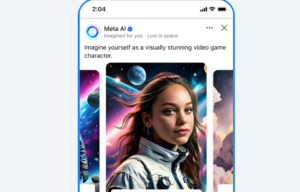
Meta Platforms Inc. has recently announced an innovative initiative to generate synthetic content tailored to individual users. This development, although somewhat overshadowed by a series of product launches at the company’s annual developers conference, opens up a significant discussion regarding the future of AI-generated content on social media.
1. Why This Matters
The traditional use of generative AI has been primarily reactive—creating content in response to user prompts. However, Meta’s new approach marks a shift toward a more proactive strategy. By surfacing AI-generated posts based on users’ interests, Meta aims to reshape how content is consumed on platforms like Facebook and Instagram.
2. Key Highlights from the Announcement
- “Imagined for You” Content: Meta is beginning tests for AI-generated content that will appear directly in users’ feeds. This includes:
- Images generated based on individual user interests.
- Custom images featuring users’ likenesses, allowing them to be the “star” of their own stories.
- User Interaction: Users will have the option to:
- Take the content in new directions, allowing for personal creativity and interaction.
- Swipe to view additional AI-generated content tailored in real-time.
- Opt-Out Feature: To address potential privacy concerns and user preferences, Meta has included an option for users to opt out of these auto-generated posts.
3. Context and Implications
- Algorithmic Evolution: This move is part of a broader trend where Meta’s algorithms increasingly prioritize content it predicts users will enjoy, often at the expense of posts from friends and family. This evolution reflects a shift toward creating a more engaging and personalized user experience, but it raises questions about authenticity and user agency.
- AI Integration Across Platforms: Meta has been exploring various ways to integrate AI into user interactions, such as:
- AI tools in Messenger.
- Previous tests that allowed AI to comment on social media threads (though this test was eventually scrapped).
4. Public Reception and Concerns
Despite the excitement surrounding AI technology, public reception of AI-generated content has been mixed:
- Skepticism Towards AI: Many individuals have expressed disappointment with the quality of AI-generated content, often labeling it as “slop.” This critique stems from its perceived mediocrity, lack of personal touch, and repetitive themes and aesthetics.
- Balancing Act: As Meta pushes this initiative forward, it faces a balancing act—how to engage users without overwhelming them with content that feels impersonal or machine-generated.
5. Future Outlook
The introduction of personalized AI content in social media feeds is likely to evoke strong reactions—both positive and negative. While some users may appreciate the novelty and creativity of AI-generated posts, others may resist the idea of their feeds being filled with content produced by algorithms rather than humans.
Conclusion
Meta’s strategy to proactively serve up personalized AI content represents a significant shift in how social media platforms might function in the future. As the company rolls out this feature, it will be crucial to monitor user feedback and engagement levels to determine whether this bold initiative enhances the user experience or alienates its audience. The prospect of feeds filled with computer-generated content is not far off, and its acceptance will ultimately depend on the balance between creativity, personalization, and user preference.
visit: gamicaltech.com